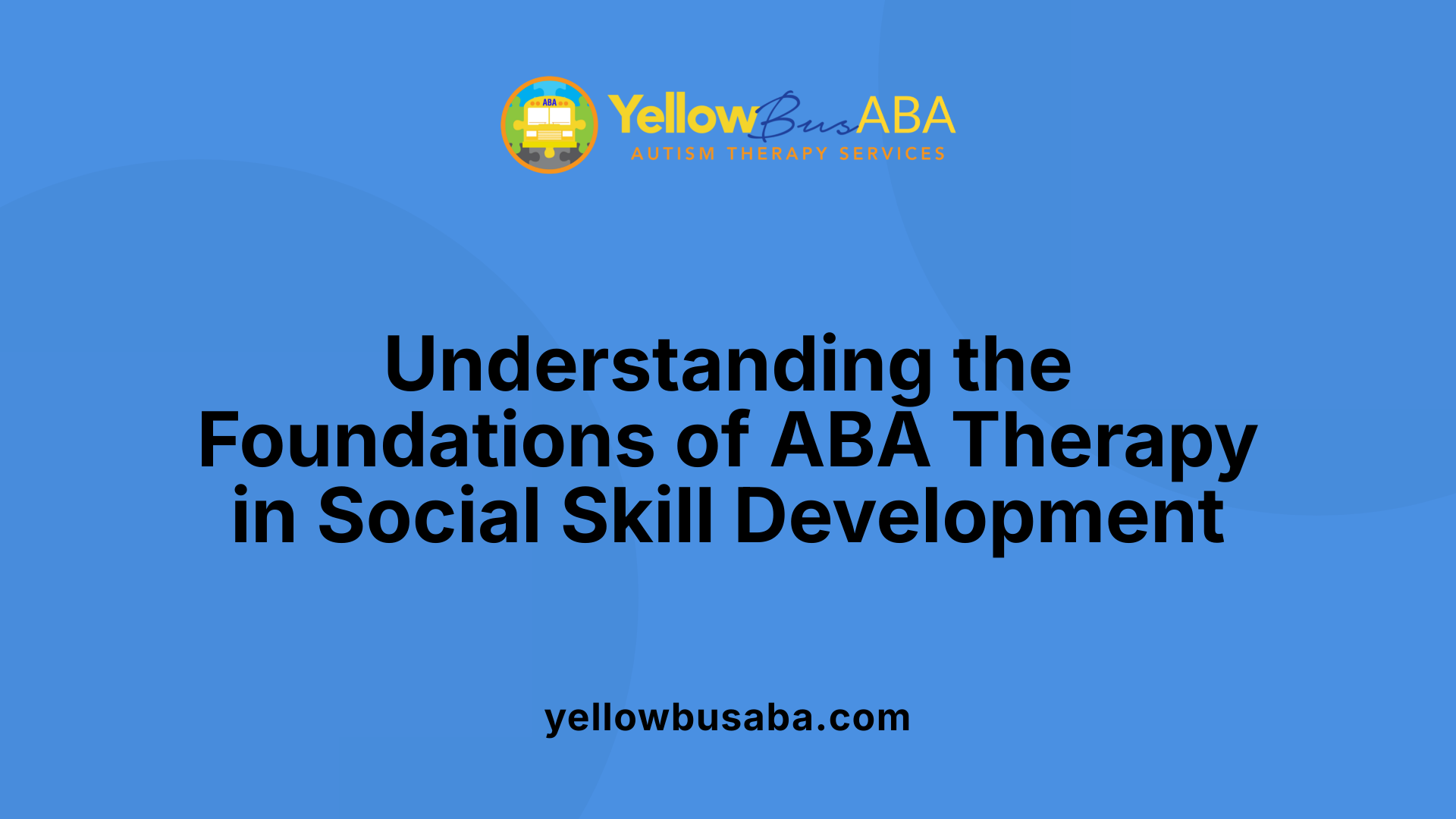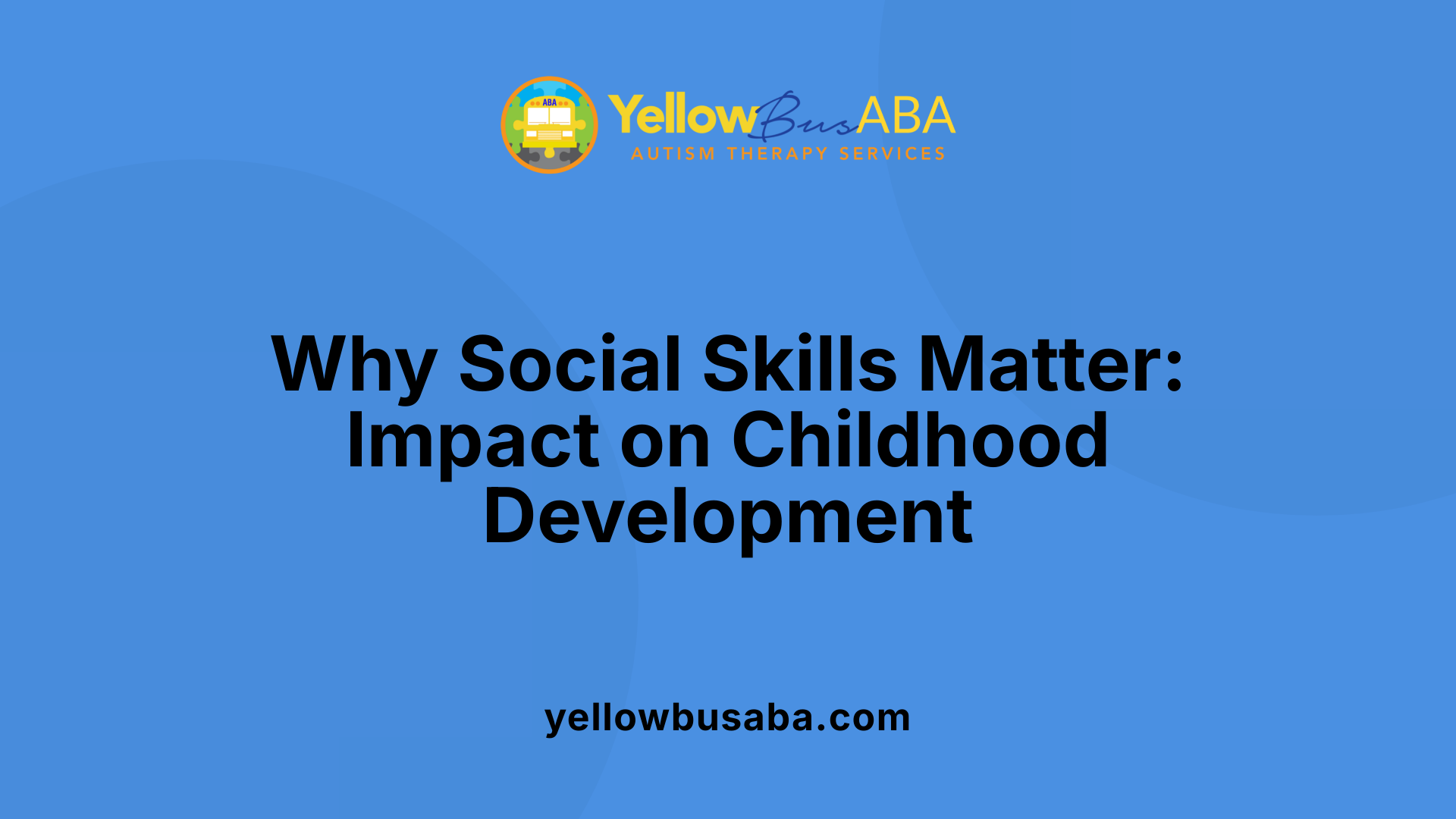Using ABA Therapy to Teach Social Skills
January 30, 2025
Harnessing ABA Therapy for Social Skill Enhancement

The Role of ABA Therapy in Social Skill Development
Applied Behavior Analysis (ABA) therapy has transformed the approach to developing social skills in children, especially those with autism. By employing evidence-based methods, ABA therapy offers a structured pathway to enhance communication and interaction capabilities. As social skills are crucial for fostering relationships and achieving personal development, understanding how ABA therapy can significantly impact these areas is vital for parents, educators, and professionals supporting children's growth.
Fundamental Principles of ABA Therapy for Social Skills

What are the basic principles and techniques of ABA therapy for improving social skills?
Applied Behavior Analysis (ABA) therapy is centered around enhancing social skills, particularly in children with autism, by utilizing evidence-based methods. The core principles involve reinforcing desired behaviors while minimizing undesired ones.
Key techniques include:
- Behavioral Skills Training (BST): This method involves demonstrating a social skill, engaging the child in practice, and subsequently encouraging independent application.
- Discrete Trial Training (DTT): A structured approach where skills are taught through repeated trials, focusing on mastery through positive reinforcement.
- Video Modeling: Uses recorded examples of social interactions to help children observe and learn appropriate behaviors.
- Natural Environment Training (NET): Incorporates real-life situations for practice, enabling children to generalize skills beyond the therapy room.
Continuous assessment ensures that goals are specific, observable, and measurable, leading to tailored interventions that meet each child’s unique needs. By employing reinforcement and modeling, ABA therapy effectively empowers individuals to navigate social interactions with confidence.
The Importance of Social Skill Development in Childhood

Why are social skills important in childhood development?
Social skills are essential for childhood development as they enable children to build positive relationships, communicate effectively, and interact cooperatively with peers. These abilities are crucial for emotional growth, helping children navigate various social situations. By developing empathy and conflict resolution skills, children learn to relate to others, which is fundamental for establishing meaningful connections.
The early development of social skills is directly linked to several benefits. Studies show that children with strong social skills tend to achieve improved cognitive abilities, better mental health, and greater academic success. Engaging with peers fosters learning through play and interaction, which reinforces essential social norms and communication techniques.
If children miss out on developing these essential skills, there can be negative consequences. They may face challenges in forming friendships, struggle in group settings, and experience heightened social anxiety. This emphasizes the need for nurturing social skills from a young age, particularly through interventions like ABA therapy that tailor strategies to individual needs.
Enhancing Social Skills in Children with Autism through ABA

How does ABA therapy enhance social skills in children with autism?
ABA therapy significantly boosts social skills in children with autism using a variety of targeted strategies. It emphasizes reinforcing positive social behaviors, which helps children learn how to interact appropriately with others. Techniques such as modeling and role-playing provide opportunities for practice in safe environments, contributing to skill mastery.
One striking aspect of ABA is the creation of structured social situations. For example, lunch groups with guided discussions allow children to engage in social interactions under the supervision of a therapist. This supportive setting not only fosters communication but also builds confidence as children navigate real-life scenarios with structured guidance.
Moreover, empathy and emotional understanding are vital components of social skills training in ABA. Children learn to recognize and interpret facial expressions, as well as articulate their own feelings. This approach nurtures social competence, enabling them to connect with peers on a deeper level. Individualized strategies tailored to each child's needs help reduce anxiety while providing clear expectations, ultimately empowering them to interact more effectively in diverse social contexts.
| Strategy | Purpose | Method |
|---|---|---|
| Positive Reinforcement | Encourage repetition of desired behaviors | Rewards for successful social interactions |
| Role-Playing | Practice social scenarios | Structured practice in non-threatening context |
| Structured Activities | Create safe opportunities for interaction | Lunch groups or team games |
| Emotional Recognition | Improve understanding of emotions | Teaching about facial expressions and feelings |
Through these combined efforts, ABA therapy lays a strong foundation for individuals with autism, equipping them with essential social skills for navigating relationships throughout their lives.
ABA Therapy Strategies for Teaching Social Skills

What strategies does ABA therapy use to teach social skills?
ABA therapy employs a variety of strategies to effectively teach social skills, essential for building relationships and navigating the community. These methods are tailored to address individual needs, enhancing their social interaction capabilities.
Discrete Trial Training (DTT): This approach breaks down complex social skills into manageable steps. Each skill is taught through structured sessions where specific tasks or behaviors are practiced individually, allowing children to master each component gradually.
Role-Playing and Modeling: In role-playing scenarios, children practice social situations, such as initiating conversations or sharing, in a safe and supportive environment. Modeling involves therapists demonstrating appropriate behaviors, which children can then imitate, reinforcing learning through observation.
Natural Environment Training (NET): This technique facilitates learning within real-world contexts. Children engage in social interactions during everyday activities, applying the skills they've learned in therapy while receiving real-time support and feedback.
Positive reinforcement plays a crucial role across these strategies. By rewarding desired behaviors, therapists encourage children to repeat successful social interactions, thereby building their self-confidence and improving their communication skills. Overall, these cohesive strategies work together to enhance the social abilities of individuals with autism.
Exploring the Benefits and Impacts of ABA Therapy on Social Skills

What are the benefits and impacts of using ABA therapy for social skill deficits?
The benefits of using ABA therapy for social skill deficits are significant, especially for children with autism. One of the primary advantages is improved communication. Through structured methods like Behavioral Skills Training (BST), children learn to initiate and maintain conversations, use appropriate body language, and understand social cues effectively. This fundamental improvement enhances their ability to form friendships and engage meaningfully with peers.
Another crucial benefit is emotional regulation. ABA therapy helps children recognize their own emotions and those of others, equipping them with skills to manage responses in social situations. Techniques such as role-playing and modeling not only teach proper interaction but also empower children to handle emotional dynamics in a constructive way.
Finally, ABA therapy fosters greater social engagement. By personalizing programs to fit individual needs, therapists can focus on the unique challenges a child faces. Positive reinforcement, along with activities that encourage interaction, helps children develop self-confidence and independence in social contexts. With these skills, children enhance their overall well-being and increase their potential for success across various environments.
ABA Therapy as a Primary Method for Social Skills Training
Role of Social Skills Training
Social skills are fundamental for building relationships and participating in community life. For children with autism spectrum disorder (ASD), these skills often require targeted training. Applied Behavior Analysis (ABA) therapy, a structured approach, effectively teaches social skills by breaking complex interactions into manageable components. Techniques within this framework, such as modeling and role-playing, allow children to practice and navigate social scenarios, thus enhancing their communication abilities.
Combining Therapies
While ABA therapy is a primary method for teaching social skills, it can also be beneficial to combine it with other therapeutic approaches. For instance, Social Skills Training (SST) focuses on enhancing social interactions through techniques like behavioral rehearsal and positive reinforcement. When used alongside cognitive-behavioral therapy (CBT), these methods provide a holistic approach to supporting children with developmental challenges.
Evidence-based Techniques
The effectiveness of ABA therapy is well-documented, highlighting its role in improving social skills among children with autism. Techniques such as Discrete Trial Training (DTT) and Natural Environment Training (NET) are evidence-based methods utilized to reinforce appropriate behavior and communication. By focusing on individual needs and using ongoing assessments, ABA therapy ensures that children can generalize their learned skills across various environments, increasing their confidence and ability to engage socially.
The Transformative Power of ABA in Social Development
ABA therapy remains at the forefront of therapeutic interventions for enhancing social skills, particularly in children with autism. Through systematic and tailored approaches, ABA helps children overcome social challenges, enriching their lives by equipping them with essential skills for communication and interaction. As a result, ABA not only aids in immediate developmental goals but also lays a foundation for lifelong social competence and success. With continuous support from therapists, caregivers, and educators, children are empowered to thrive in their social environments, demonstrating the long-lasting impact of ABA therapy.
References
- ABA Therapy for Social Skills - Empower Behavioral Health
- Social Skills Training in Applied Behavior Analysis? ASD
- How ABA Therapy Helps with Social Skills - PediaPlex
- Developing Social Skills Through ABA Therapy for Autism
- Social Skills for Autism
- ABA Techniques for Teaching Social Skills - Learn.Do Bulletin
- ABA Therapy for Social Skills: Building Connections
- Mastering Social Skills: ABA Therapy for Autism
- Harnessing ABA Therapy for Social Skills Development in Autism
- ABA Therapy's Impact on Social Skills | All Star ABA






.jpg)